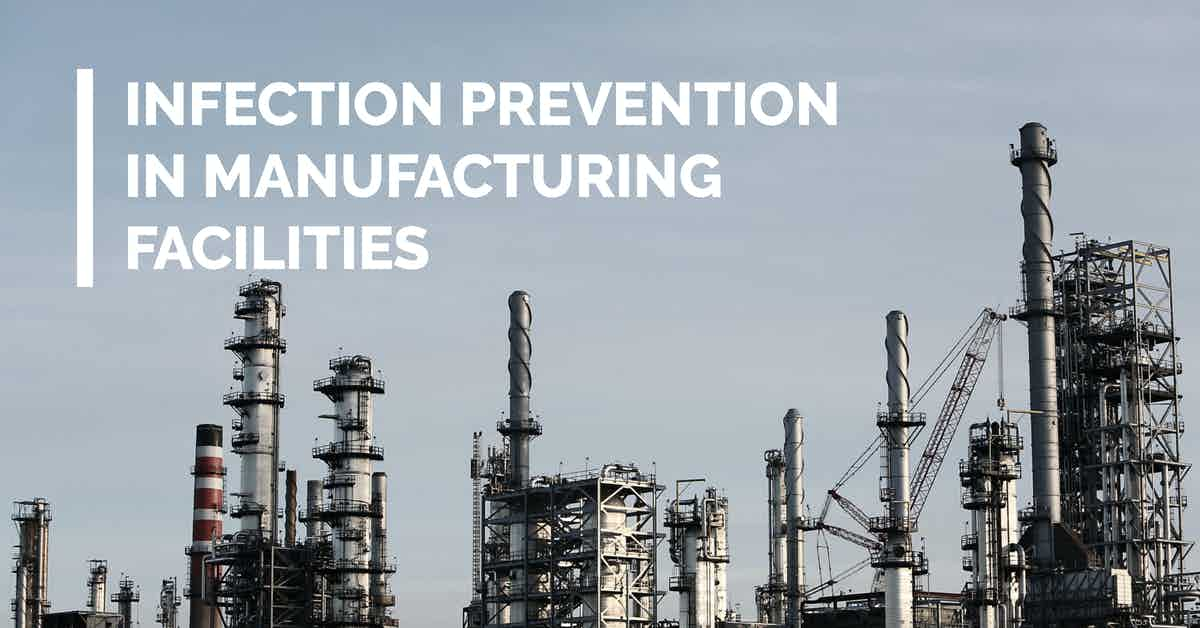Manufacturing facilities are critical to the U.S. supply chain, cybersecurity, and National Defense--underscoring the importance of maintaining a smooth operation by providing a clean, safe, and healthy work environment for employees.
The Importance of Infection Prevention for Manufacturing Workplaces
The COVID-19 health crisis demonstrated the importance of the manufacturing industry to U.S. consumer, corporate, and government interests--underscored by the wide swath of sectors listed by the U.S. Cybersecurity and Infrastructure Security Agency (CISA) as critical, including:
- Iron Mills
- Steel Mills
- Medical Devices and Chemical Manufacturing
- Alloy Manufacturing, Production, and Processing
- Engine and Turbine Manufacturing
- Earth Moving, Mining, Agriculture and Construction Equipment Manufacturing
- Electric Motor Manufacturing
- Vehicles and Commercial Ships Manufacturing
- Aerospace Products and Parts Manufacturing
- Locomotives, Railroad and Transit Cars, and Rail Track Equipment Manufacturing
Interruptions to these areas of the economy create supply chain issues, leading to facility closures and disruptions to the distribution of vital resources to downstream consumers and businesses--resulting in unemployment, additional health issues, and potential national security challenges.
Preventing Infections and Disruptions to Production
Maintaining a smooth production process is difficult enough during the best of times.
Challenges, such as illness, FMLA, and Workers' Compensation leaves of absence, disrupt the process by removing skilled and experienced workers.
In the case of pathogens and illness-causing bacteria and molds, entire teams can be taken down, severely impacting production.
Even if the crew members can still work through the illness, they are operating at a dangerously reduced capacity that could potentially lead to further injuries and disruptions.
Illness, like workplace accidents, while not entirely avoidable, can be significantly mitigated with the proper training, processes, and safety precautions, including:
- Hand Hygiene - Each manufacturing employee should be trained in the 7-point handwashing guidelines--Wet your hands, apply soap, lather, scrub for a minimum of twenty seconds, rinse, dry with a clean towel, wipe down the sink and faucet, and apply hand sanitizer as necessary. This process should be completed prior to eating, in between shifts, and before and after coming into direct contact with others.
- Increase Cleaning and Disinfection Frequency - Increasing cleaning and disinfection frequencies will help keep detectable infectious disease levels down to a minimum throughout the day. All occupied areas should be cleaned at least once per day, and unoccupied areas should receive attention approximately once per week. High-contact surfaces, especially buttons, handles, touch plates, and handrails, should be disinfected between shifts and at the end of the day.
- Training - Educating the workforce on how to recognize symptoms of illness in themselves and others, how to protect themselves and ensure a safe workplace for everyone, how and when to wear personal protective equipment, and what behaviors and situations are more likely to contribute to the spread of illness will significantly reduce the spread of pathogens all year long.
- Respiratory Etiquette - During an outbreak of any kind, and especially during cold and flu season, it is important for workers to avoid uncovered coughs and sneezes. Standard etiquette dictates one cough and sneeze into the elbow and then wash with soap and water as soon as possible, using hand sanitizer as a substitute when available.
- PPE - The best way to ensure workers have access to and wear recommended protective equipment to prevent the spread of airborne, bloodborne, or other types of pathogens is to provide them with the equipment and train them in the PPE's proper use.
- Emergency Planning - Creating a plan that is widely distributed and disseminated among the manufacturing plants leadership will ensure that, in the event of an outbreak or other emergency, everyone knows how to respond in a safe and responsible manner.
References & Resources
- Desperately Seeking Supplies: Inside the Critical Infrastructure Manufacturing Supply Chain
- Manufacturing Facilities: Key Strategies to Prevent COVID-19 Infection among Employees
- Virus Infection Prevention and Control for Manufacturing and Industrial Workplace
Takeaway
How critical are manufacturing workers to the U.S.?
According to the official position of the CISA;
The Centers for Disease Control and Prevention (CDC) advises that critical infrastructure workers may be permitted to continue work following potential exposure to COVID-19, provided they remain asymptomatic and additional precautions are implemented to protect them and the community.
Unlike many professions, manufacturing employees don't have the luxury of working from home when they're ill, and the absence of skilled workers is typically felt quickly, both up and downstream.
Whether during a pandemic, cold & flu season, or as a precaution to ensure the highest standards of worker health and safety, increased `cleaning and infection prevention practices will ensure your manufacturing business remains open and productive all year long.
Outsourcing is a proven method for cost-effectively employing highly-trained and equipped janitorial service providers for a fraction of the cost of maintaining the same standards in-house.
Contact us today and discover why Vanguard Cleaning Systems® is the Standard of Clean® for businesses throughout Northwest Arkansas, Missouri, and Oklahoma.
In Oklahoma, dial 918-960-4450
In Arkansas, dial 479-717-2410
In Missouri, dial 417-812-9777

